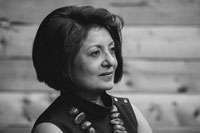Every Day Is a Good Day to Hear More Women in the Media
ROME, Mar 07 (IPS) - On International Women's Day newspapers and radio shows are filled with women's voices. Yet too often the media's attention is fleeting.
 Farhana Haque RahmanThese are the best of times, but without a doubt also the worst of times, for journalism and journalists – especially women in the media.
Farhana Haque RahmanThese are the best of times, but without a doubt also the worst of times, for journalism and journalists – especially women in the media.
According to the Global Media Monitoring Project, women still account for only 24 percent of the people "heard or read about in print, radio and television news across the world."
Or as women's media organisation Foreign Policy Interrupted have put it: "a woman over 65 is less likely to be cited as an expert in the media (than) a boy in the 13 to 18 age group."
Hearing women in the media is not just about who is holding the notebook and voice recorder. Journalists also need to think about who they quote in their articles.
IPS is proud to have an editorial policy of deliberately seeking quotes from women on all topics, not just on topics that have traditionally been considered "women's issues".
For those women who are journalists, many face violence and harassment even as they go about their daily work. Two-thirds of more than 900 women journalists surveyed by the International Women's Media Foundation said they had experienced some kind of threat or abuse – often by male colleagues. We all should take a deep breath.
More than one in five of the women media professionals asked said that they had experienced physical violence in relation to their work - the majority of these described it as sexual in nature – and government officials, police and apparently random people in crowds were cited as frequent perpetrators.
IPS applauds the efforts of UNESCO Director-General Irina Bokova and Christiane Amanpour, the high-profile CNN correspondent who is now serving as UNESCO's Goodwill Ambassador on freedom of Expression and Journalist Safety, on their campaign to stamp out the most existential threats to female journalists.
Yet any gains made in bringing women's voices to the fore in the media are threatened when the news industry itself is put under pressure.
The sector is already in a commercial pinch, reducing resources available for reporters to provide their watchdog function. On top of that, there is a sense of growing censorship, taking different forms in different parts of the world.
Press freedom isn't threatened only by violence. Esteemed scholar Partha Chatterjee denounced what he called a "McCarthyite era" wave in India. Journalists have been killed or intimidated in countries across the globe, and many deliberately avoid reporting on their nemeses. And the bad winds aren't blowing only in developing countries. A U.S. presidential candidate fanned the flame of our concern last month when he suggested changing libel laws to make it easier to "win money" from journalists by suing them.
Free speech is widely believed to be a public good. But it is also "the most complex and controversial right," in the recent words of Irene Khan, head of the International Development Law Organization (IDLO). It may not be an absolute right but it is one that is intimately tied up with what Khan called "the right to hear."
We have a right to hear diverse voices and particularly women's voices in the media every day. We – including we journalists – also have a responsibility to listen.
(End)
© Inter Press Service (2016) — All Rights ReservedOriginal source: Inter Press Service
 Global Issues
Global Issues